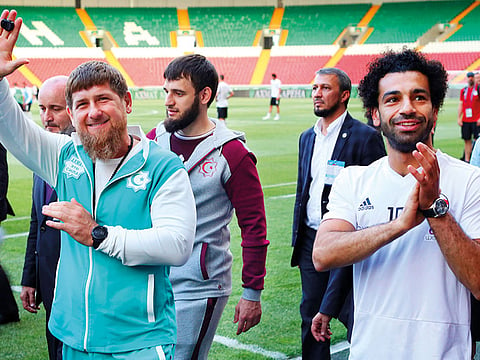Political flashpoints add a bad taste to World Cup
Salah and Switzerland embroiled in episodes

Moscow: The World Cup was thrust into the combustible mix of politics and football — dangerous ground that world football takes great pains to avoid — as a growing number of disciplinary proceedings and a star player’s threatened retirement brought several sensitive international flashpoints to the tournament’s doorstep this weekend.
The crises involved players for several teams and touched on a range of topics: Kosovar independence, Serbian nationalism, a beloved Egyptian striker and a controversial Chechen leader. At least one of the disagreements could potentially force Fifa, world football’s governing body, to issue suspensions in the middle of the tournament — possibly affecting which teams advance out of one of the tournament’s first-round groups.
Fifa announced that its disciplinary committee had opened three more proceedings related to Friday’s testy Switzerland-Serbia match — bringing the total from the game to six. Hours later, it emerged that one of the tournament’s most popular players, Egyptian striker Mohammad Salah, was considering retiring from his national team in the wake of his interactions with a Chechen politician.
Fifa’s political problems began when Swiss players Granit Xhaka and Xherdan Shaqiri both made the so-called double-eagle symbol with their hands after scoring in a 2-1 victory against Serbia. The gesture, made by linking the thumbs and fanning out the fingers on both hands, is a nationalist sign that many with ethnic Albanian roots make to symbolise the black eagle in Albania’s flag. (Both Xhaka and Shaqiri have roots in Kosovo, an ethnically Albanian province that fought a war of independence against Serb-dominated Yugoslav forces in the late 1990s.)
To most of the world, the symbol holds no meaning. One Brazilian commentator thought the players were making a peace sign and applauded their attempts at Balkan reconciliation. In Serbia, however, the gesture was viewed as a provocation.
Serbia’s football federation faced its own disciplinary proceeding, though, for a display of political messages by its fans during the game. Serbia had already been fined at this World Cup after its supporters displayed what Fifa said was the banner of a “Serbian paramilitary nationalist movement” during the game against Costa Rica.
Then, on Sunday, Fifa opened three new inquiries: against Switzerland’s Stephan Lichtsteiner, who is not of Albanian descent, for making the double-eagle gesture, and against Serbia’s federation president, Slavisa Kokeza, and its coach, Mladen Krstajic, for statements they were accused of making after the game.
Then came word that Salah, Egypt’s biggest star, was considering retiring from the national team once the World Cup ended after he was drawn into a political controversy related to his federation’s decision to live and train in Chechnya during the tournament.
Salah has become one of the world’s highest-profile players over the past year, and he was the star attraction at Egypt’s training facility in Grozny, the capital of the Russian province of Chechnya.
On the eve of the tournament, photos emerged of Salah alongside Ramzan A Kadyrov, the Chechen leader, at Egypt’s first training session. After learning that Salah was scheduled to miss the session, Kadyrov drove to Egypt’s hotel to summon the player from bed. Kadyrov has been the president of Chechnya since 2007, three years after the assassination of his father, and has been accused of overseeing torture and extrajudicial killings.
Salah has always deliberately avoided being made into either a political or religious figure, and CNN reported that he was furious that he had been exposed to the criticism that followed the publication of the original photographs with Kadyrov.
Salah is believed to be upset because he believes he has not been offered suitable protection by the Egyptian FA — which selected Grozny as its training facility — and he is considering whether Monday’s game against Saudi Arabia will be his last for Egypt. He is 26.
The disciplinary proceedings arising from the Switzerland-Serbia game, however, present a more prickly problem for Fifa. Xhaka, Shaqiri and Lichtsteiner — three of Switzerland’s best players — could each face a two-game ban if their goal celebrations are ruled political acts, and that could force both of them out of their group stage finale against Costa Rica on Wednesday.
Switzerland’s victory over Serbia gave it 4 points through two games, the same as the group leader, Brazil. Serbia is only one point behind with 3, so a diminished Switzerland roster could directly affect who advances to the next round. If Serbia defeats Brazil and Switzerland loses to Costa Rica, the Serbs could advance ahead of Switzerland.
“In football you have emotions,” Shaqiri said in his short appearance before the news media after the game. “You can see what I did. It was just emotion.”
The Serbians, though, were enraged. Kokeza, the federation president, called the gesture “scandalous and shameful,” and he and Krstajic both accused Fifa and the match’s German referee, Felix Brych, of anti-Serb bias because of how the game was officiated.
“I do not expect Fifa to take action in order for this brutal robbery not to happen again,” Kokeza told the BBC. “I repeat, it was all directed.”
But it was the gesture that continued to be the focus of discussions about the match.
“When Albanians are showing this to Serbs, it’s basically, ‘You got punked by Albanians,’” said Jelena Subotic, a professor of political science at Georgia State University. “These Albanian players are just doing this to annoy Serbs, while in fact they are playing for Switzerland. Switzerland has no beef in this battle.”
Switzerland, meanwhile, is merely basking in the victory. The tabloid newspaper Blick, which has in the past criticised Shaqiri for a perceived split in loyalties, invited its readers to send in photos of themselves doing their own two-handed eagle salute.
Sign up for the Daily Briefing
Get the latest news and updates straight to your inbox



